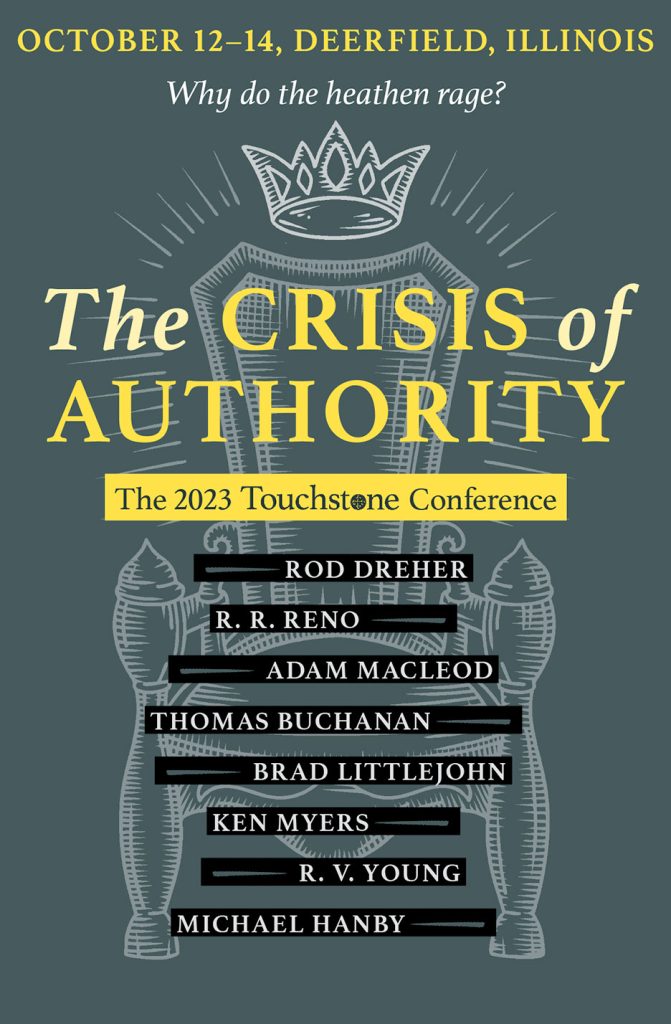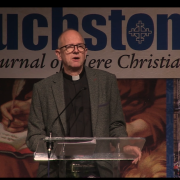For decades I have been spiritually strengthened from Ken Myers’s ministry at the Mars Hill Audio Journal, which offers interviews with a variety of scholars on the most pressing issues of our time. Myers, whose first radio interview was with Johnny Cash, has spoken to some of the leading philosophers, sociologists, historians, psychologists, economists, and theologians of our day.
In addition to running Mars Hill Audio, Myers is a regular contributor to Salvo’s parent publication, Touchstone Magazine. Published by the Fellowship of St. James, Touchstone is a bimonthly “Big Think” journal for reflecting more deeply about the faith.
In the latest issue of Touchstone, Myers contributed an article titled, “Ruler Over All: Notes Toward the Restitution of Christian Culture.” Myers explored the definition and significance of culture, and the impossibility of a purely neutral secular state. Drawing on the work of Matthew Arnold, T. S. Eliot, Philip Rieff, and other thinkers, he points out that, “To be a member of a culture is to inherit, inhabit, honor, and respect a shared way of life.” Myers continued:
For millennia, human beings within traditional cultures were given guidance about how to live, guidance that served like roadmaps and guardrails. The work of a culture was to sustain an “inherited organization of permissions and restraints.” A culture was a moral legacy, a received and communally shared way of life, not just a set of options for personalized lifestyles, to be adopted or discarded at whim.
Myers believes that as our society increasingly throws off all restraint and moral guardrails, we are moving into a state of affairs that might best be described as “post-cultural America.” One symptom of our current anti-culture is the illusion that pluralism and diversity are possible within a value-neutral secular order. But this “ignores how substantive ideas about what is good or true are frequently—necessarily—smuggled into allegedly neutral policies and procedures.” Myers continues:
The modern liberal state—which polices the shape of modern culture—claims to be neutral, but its operational assumptions about the nature of reality are metaphysically biased…. The very claim that a society should be ordered without reference to any vision of the nature of reality is itself a metaphysical claim.
In Myers’ reading of the situation, the only antidote to the nihilistic metaphysics of the modern secular state, and the only cure for the emerging anti-cultural condition, is Christianity. Myers quotes T.S. Eliot:
If Christianity goes, the whole of our culture goes. Then you must start painfully again, and you cannot put on a new culture ready made. You must wait for the grass to grow to feed the sheep to give the wool out of which your new coat will be made. You must pass through many centuries of barbarism.
How do we painfully rebuild the ruins amid widespread barbarism? Following Eliot, Myers believes we need to go back to basics and reassert the centrality of metaphysics. Indeed, behind our cultural upheavals is a metaphysical confusion about the nature of reality itself:
Modern men and women are deeply confused about what things really are, not just about what is true and what is good, but about what is real, a confusion that is sustained by many of our cultural institutions.
Myers then quotes Paul Tyson, whose 2014 book Returning to Reality makes the case that what our world needs is a paradigm shift in our very perception of reality:
For the very hope of a basic shift in our civilizational direction, there needs to be an alternative vision of the very nature of reality. And there needs to be a community, a fellowship of believers, who can imagine and enact an alternative way of life via acts of intelligent collective micro-resistance premised on the ontological reality of the Lordship of Christ and the participation of Christians in the body of Christ on earth…. Metaphysics is never simply metaphysics; metaphysics is always also politics, commerce, technology, morality, religion, art, and knowledge. So what we assume to be the nature of reality—what metaphysical beliefs we are committed to—is a matter of the utmost practical and political significance.

Hosted in Deerfield, Illinois from October 12-14, this year’s conference will focus on helping us understand the crisis of authority currently gripping our nation. At the conference, Myers will conduct an interview on Friday, and also interview our panel of speakers on Saturday.
If you’re able to make it, be sure to visit the Salvo table to say hello. I’ll be there, as will Terrell Clemmons and others from the Salvo team.
For more information and to register, visit The Crisis of Authority: The 2023 Touchstone Conference.


